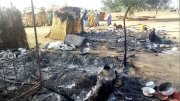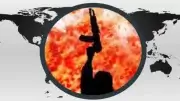Understanding the Historical Timeline and Current Dynamics in Syria
The Fall of Damascus: A Geopolitical Shift
The recent fall of Damascus signifies a profound geopolitical shift in the Middle East, with far-reaching historical, political, and spiritual implications. As one of the world’s oldest cities, Damascus has long been a focal point of civilization and conflict. Today, its collapse marks a turning point, with ripple effects for regional stability, biblical prophecy, and Christian communities.
To delve deeper into the historical and current dynamics surrounding Damascus, Amir Tsarfati provides a comprehensive and insightful analysis in his latest YouTube report, MidEast Update: The Fall of Damascus. This must-watch update unpacks the significance of recent events in Syria, offering clarity on the factions involved, their objectives, and how these developments align with biblical prophecy. Amir’s report is embedded below for easy access:
398K views Streamed 4 days ago: FOLLOW Amir’s YouTube Channel: Behold Israel with Amir Tsarfati And follow his latest news here.
Join us for a special MidEast Update live from CONNECT with Amir! Gain fresh insights as Amir explores the prophetic and modern significance of Syria and Damascus, from their biblical roots to the rise of the Assad regime and Shia influence. He’ll also uncover the dynamics of Julani and his organization, offering a comprehensive perspective on the region. Amir will also aim to answer your questions in the last portion of the update. Don’t miss this opportunity to deepen your understanding of these critical events!
0:09 – Introduction & Prayer
2:56 – The importance and history of Damascus
5:00 – Overview of Syria’s historical significance
6:32 – Sykes-Picot Agreement and French mandate over Syria
7:57 – The rise of Hafez Al-Assad and his regime
10:00 – The brutal repression of the Hama Uprising in 1982
12:22 – Assad’s chemical attacks on civilians, including the 2013 chemical attack
13:21 – The start of the Syrian civil war in 2011 and its spread
15:35 – The role of ISIS and foreign intervention, including Russian and Iranian support
16:47 – Current situation in Syria and the impact of recent Israeli actions
17:05 – The rebels’ role and changing power dynamics in Syria
20:26 – The Kurdish forces and their role in the conflict
23:53 – The fall of Damascus and Syria’s future
24:29 – Israel’s actions to protect its borders and influence over Syria
27:26 – Israeli Air Force operations in Syria
30:00 – Bible prophecy and the future of Damascus
32:10 – The rise of Islamic extremism in Syria and its implications for Israel
36:38 – Question about Iran’s involvement in Syria and future conflicts
37:31 – The role of Turkey in the conflict
41:37 – The possibility of a nuclear attack and how Israel would respond
43:44 – Thoughts on the biblical significance of current events in the Middle East
48:37 – Israel’s strategies and plans to ensure security in the region
52:09 – How to be Saved and go to Heaven.
The Historical Importance of Damascus
Damascus has stood as a beacon of human history for millennia, first mentioned in the Bible as the home of Abraham’s servant, Eliezer (Genesis 15:2). Positioned in the Fertile Crescent along ancient trade routes like the Via Maris and the King’s Highway, Damascus was a critical crossroads for commerce and culture. Over centuries, it played pivotal roles in the Roman, Byzantine, and Islamic empires.
The city’s significance extended into the New Testament era, where it became the backdrop for Paul’s dramatic conversion on the road to Damascus (Acts 9). This event not only transformed Paul’s life but also marked a key moment in the spread of Christianity. Damascus later flourished as a cultural and political center under Islamic rule, including its role as the capital of the Umayyad Caliphate in the 7th century. Its long history has made it a symbol of endurance and resilience, even in the face of modern upheavals.
A Modern Geopolitical Shift
In recent decades, Damascus has been at the heart of Syria’s turbulent history. Following Syria’s independence in 1944, the Assad regime emerged as a dominant, authoritarian force. Hafez al-Assad, and later his son Bashar al-Assad, maintained control through a brutal combination of military power and political suppression. This iron grip, however, began to weaken during Syria’s civil war, which erupted in 2011 during the Arab Spring.
The ongoing conflict fragmented Syria, dividing the nation among Sunni rebels, Kurdish factions, and extremist groups like ISIS. The Assad regime, backed by Iran, Russia, and Hezbollah, fought to retain control but faced mounting resistance. The recent fall of Damascus underscores the regime’s inability to maintain power, as rebels and external forces reshape the region’s political landscape.
Implications for Regional Power Dynamics
The collapse of the Assad regime in Damascus signals a dramatic geopolitical shift in the Middle East. Israel has played a critical role in this transition, conducting precise military operations to neutralize threats from Syria’s military infrastructure, including chemical weapons facilities. These actions not only protect Israel but also prevent such weapons from falling into the hands of extremist groups.
Iran’s influence in Syria has also waned, as its proxy network—including Hezbollah—faces significant setbacks. This marks the crumbling of what many have called the “axis of resistance,” a coalition that sought to surround and weaken Israel. Meanwhile, Turkey has emerged as a key player, supporting Sunni rebels and increasing its influence in the region. This new power dynamic reshapes alliances and sets the stage for future conflicts and resolutions.
Biblical Prophecy and Christian Reflection
For Christians, the fall of Damascus holds profound spiritual significance. Isaiah 17 predicts that Damascus will one day become “a heap of ruins,” uninhabitable and utterly destroyed. While this prophecy has not yet been fully realized, the city’s collapse could be a precursor to its ultimate fulfillment. Such events remind believers of the relevance of biblical prophecy and God’s sovereignty over history.
The situation in Damascus also highlights the growing persecution of Christians in the region. Rebel factions, including extremist groups, pose severe threats to Christian communities, often forcing them to flee or face violence. As followers of Christ, we are called to pray for these persecuted believers, advocating for their safety and freedom.
Why This Matters Now
The fall of Damascus is more than just another chapter in Syria’s turbulent history; it is a moment that reshapes the geopolitical landscape of the Middle East. The weakening of Iran’s proxy network, the rise of Turkey’s influence, and the diminished threat from Hezbollah all create a new reality for Israel and the region. For Christians, these events offer a powerful reminder of the intersection between current affairs and God’s eternal plan.
Understanding the historical and spiritual significance of Damascus equips believers and others with a clearer perspective on the challenges and opportunities ahead. By staying informed and rooted in faith, we can approach these changes with wisdom, hope, and a commitment to pray for peace and justice in the region.
This content was drafted with assistance from ChatGPT, OpenAI’s language model.





